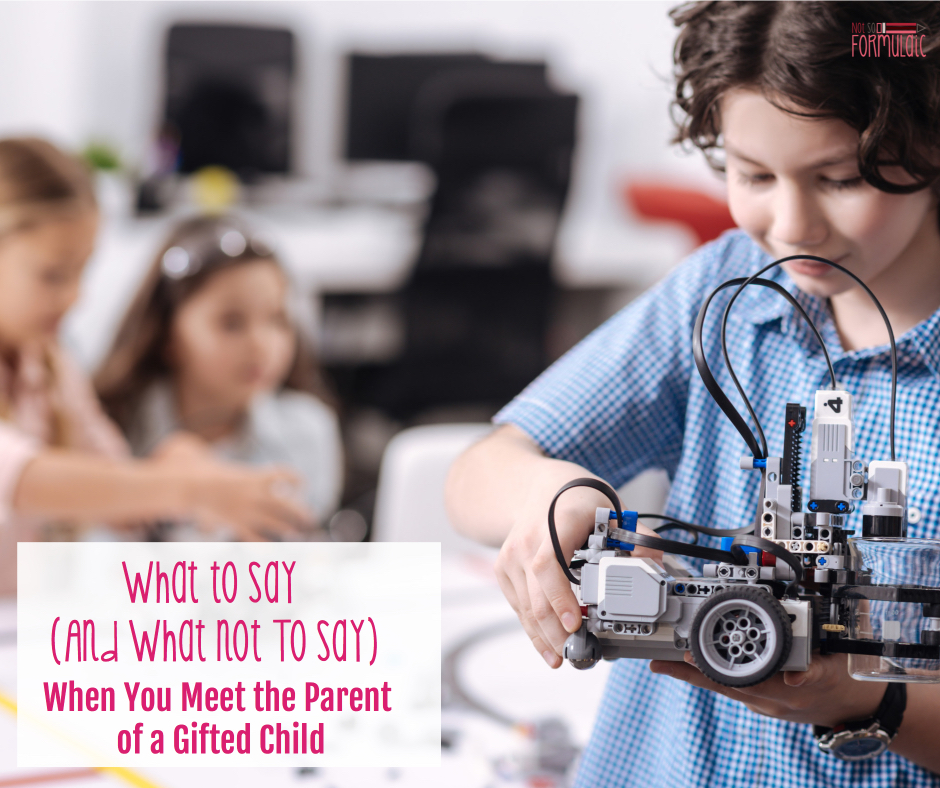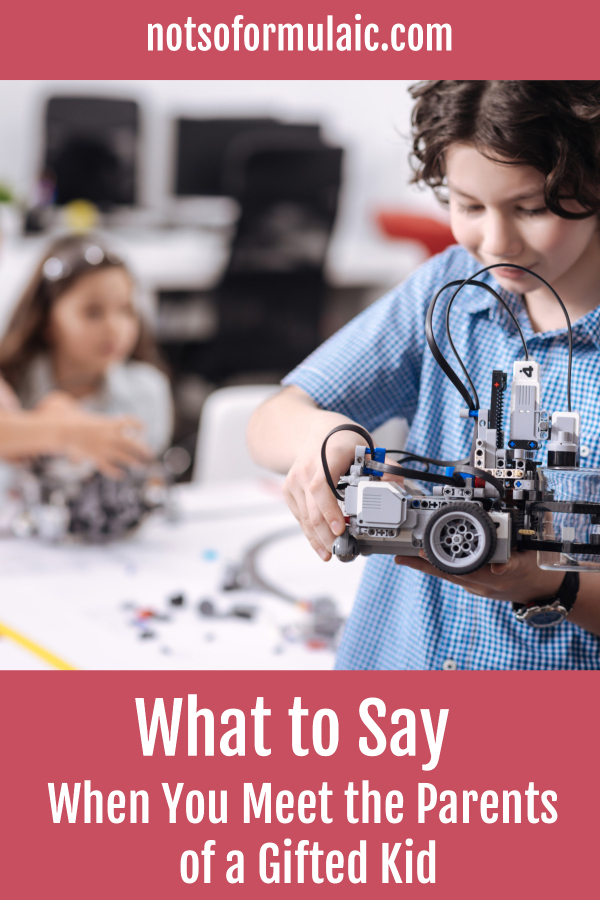Do you have friends or acquaintances with gifted children? Are you never sure what to say? Here’s what to say (and what not to say) when you meet the parents of a gifted child. Let’s build a village, not a greater divide.
Questions that make me uncomfortable:
“How much do you weigh?”
“How old are you, exactly?”
“What’s your opinion on [insert controversial topic continually in the news]?”
“What’s the square root of 5, 075?”
What makes me squirm the most, though, is a seemingly innocuous inquiry: “Where do your children go to school?”
Well, they don’t. I’m currently homeschooling three gifted kids, but I don’t feel comfortable saying that. Society has a number of preconceived notions about what it means to be gifted, and no – they aren’t always complimentary. Those notions show up in casual conversation, especially with people I’ve just met.
Cue assumptions, awkward silences, and hurt feelings on both sides of the interaction, and nobody wants that.
We want to build connections and make friends instead.
I get it, though. I held a lot of the same preconceived notions before I had my own children. What’s more, I was a high school English teacher of gifted students. In hindsight, I said a lot of dumb things to the parents I met.
If you are the parent of a gifted child, or if you have the opportunity to meet and/or work with the parents of a gifted kid, here’s a taste of the comments I made before I had my own children, and what I should have said instead.
What to Say (and What Not to Say) When You Meet the Parents of a Gifted Child
Don’t say, “Every child is gifted.” Say, “That’s awesome. What a journey you’re on!”
Every child is a gift. Every child has talents. But not every child is gifted – at least not in the sense used here.
As humans, we are unique and unrepeatable, and each of us has areas in which we excel. The same is true for children: some kiddos fall in love with dance or the arts, channeling the skill of Misty Copeland, Bob Fosse, or Maggie Smith. Others climb hills in search of Mount Everest or pound the sidewalk after Usain Bolt.
When we say every child is gifted, we say every child has the same gift. We do much better when we acknowledge individual talents instead.
Don’t say, “Are you sure it isn’t Autism (Asperger’s, ADD, etc.)?” Say, “That passion (curiosity, precociousness, etc.) will take her far.”
Gifted kids are different. There is also a correlation between levels of giftedness and quirks in behavior, primarily the result of sensitivities – heightened intellectual, emotional, physical, and sensory awareness – which can make a child seem awkward or out of place. It is also true that intellectual giftedness and Autism Spectrum Disorders can exist comorbidly. It’s called Twice Exceptionality, and roughly two to five percent of gifted children present this way.
Now my oldest daughter carries traits of the autism spectrum, and on most days my other two could pass for creatures from Mars. But assuming (and asking) if a child might have ASD or a learning disability is offensive to families on both sides of the aisle. Every child deserves encouragement in her interests, whether she’s typical or not. Focusing on the beauty of the passion or personality trait keeps the interest away from labels and toward the child’s heart.
Don’t say, “You must work with her at home.” Ask, “What are her interests right now?”
Ninety percent of educating a gifted child is getting out of the way, providing free access (within reason) to the topics she wants to pursue. Very few parents of gifted kids sit at home with flash cards or practice rote memorization (unless, of course, their kids are into that sort of thing). Their own rabbit hole tendencies are practice enough.
In my house, interests vacillate between dinosaurs and mammal behaviors. Other families might be immersed in Greek history or the study of space. Asking about current interests reveals a genuine desire to get to know not only the child but the family dynamic. It’s opening doors to commonalities and partnerships: you never know when you yourself might be the perfect contact for opportunities in a certain field.
Don’t say, “My kids are gifted, too, but I don’t want them labeled. Kids just need to be kids.” Try: “We’d love to hang out sometime.”
Friendship can be hard for gifted families. In some ways, it’s not unlike parenting a child with special needs. Social situations can be dicey because of Twice Exceptionalities or sensitivities. Because the way a gifted child processes information can be different from her peers, friendships for the child can be few and far between.
As a result, most gifted families crave companionship by getting to know other families who love us, warts and all. Our children’s characteristics aren’t challenging or threatening. If anything, they can be isolating, and it’s hard to feel alone.
Don’t say, “School must be a breeze!” Ask, “What educational choices have you made? How are they going for you?”
Some gifted children thrive in a school environment. Others, frankly, do not.
You’ll find a variety of school choices among gifted families, with many who have pursued more than one. My own children have had a hybrid of traditional and homeschooling, with homeschooling winning out for the foreseeable future. Asking this question opens doors to conversation. It will help you get to know each other and form a bond of mutual respect – the first step to building friendships.
Gifted children are children. Their parents are human, too.
I’ve learned the hard way as an educator and a parent that while the wrong questions create division, the right ones foster community.
Let’s celebrate our children’s talents and find our common interests. It’d be great to build a village with you.
[rad_rapidology_inline optin_id=”optin_1″]
Like this post? Read on:
I’m Not Bragging When I Tell You My Child is Gifted
I Will Treasure You: Resolutions for My Gifted Child
I Can’t Tell You My Child is Gifted: Why a Gifted Mind is More than a Growth Mindset


Great points! There is so much misunderstanding and insensitivity about giftedness. I would imagine that just about every parent of a gifted child has stories of how others have responded inappropriately. It is a reminder of how we must continue to clarify and explain.
Thank you, Gail. I’ve enjoyed reading your blog; thank you for stopping by!
So many great points. This is something I honestly did not know much about, so thanks for sharing these insights!
Absolutely!
Love this. So true. “All kids are gifted,” mmmm, well, I remember the look on my beautiful 3rd grade girl’s face the moment she was turned down to be in the school “talent” show for the second year in a row. Praise God for her total trust in her mommy when I explained to her that she is very, very talented, but not all talents can be shown on a stage.
For myself, growing up academically at the “top” of the class, it was very painful to realize the truth that “it’s lonely at the top.”
At 40, I’ve learned that each individual is “tops” at that one talent that God chose to be their “gift.” And we can look at each other as comparisons for whose gifts are going to make me feel less than them today, and whose gifts are going to make me feel like the “tops” again today, if we want to, but what a colossal wasted opportunity.
What would happen if we started looking at each other and just seeing … each other?
Things would be very, very different, I’m sure.
I have three “gifted” children , now grown, and wow, while I guess this article is well-intended, I find it irritating on a number of levels. My friends whose child went to Juilliard did not present me with a list of things to say and not say to them about their talented violinist daughter.
That’s wonderful, and I imagine that’s because they didn’t have to. You are probably a very thoughtful person, and with three poppies of your own would never have approached your friend in such a way.
I think the problem lies in assumptions and judgments, which naturally, everyone has a tendency to make. It’s not easy raising children, period. Add in a special need (like giftedness, because it really isn’t a gift), and it gets exponentially harder.
Thanks for stopping by.